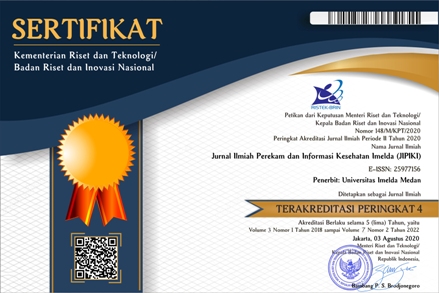Gambaran Pengetahuan dan Sikap Pasien Post Bedah Elektif tentang Informed Consent di RS X Tahun 2024
DOI:
https://doi.org/10.52943/jipiki.v9i2.1675Keywords:
Knowledge, Attitude, Informed ConsentAbstract
Informed consent is giving consent after obtaining complete information. The patient has the right to accept or reject some or all of the assistance measures that will be provided. This decision depends on the patient's knowledge and attitude regarding consent to medical treatment. Several cases of medical malpractice in Indonesia actually started with the failure to implement informed consent properly. The aim of this research is to analyze the knowledge and attitudes of post-elective surgery patients regarding informed consent at Hospital X. This type of research is descriptive quantitative. The sampling technique uses accidental sampling. The population in this study was 42 patients after elective surgery in December 2023. The research instrument used a questionnaire sheet. The results of the study showed that of the 42 post-elective surgical patients regarding informed consent at Hospital Efforts are needed to simplify explanations in language that is easy for patients to understand and use certain media to improve patient understanding.
Downloads
References
Kemenkes RI, “Permenkes No 3 Tahun 2020 Tentang Klasifikasi dan Perizinan Rumah Sakit,” Tentang Klasifikasi dan Perizinan Rumah Sakit, no. 3, pp. 1–80, 2020, [Online]. Available: http://bppsdmk.kemkes.go.id/web/filesa/peraturan/119.pdf
Republik Indonesia, “Undang-Undang UU Nomor 17 Tahun 2023 tentang Kesehatan,” 2023.
T. A. Nisa Reza Maghfirotun, Livana PH, “Hubungan Dukungan Keluarga Dengan Tingkat Ansietas Pasienpre Operasi Mayor,” J. Keperawatan Jiwa, no. 2011, pp. 116–120, 2018, [Online]. Available: https://jurnal.unimus.ac.id/index.php/JKJ/article/view/4447/4077
R. Fandi, “Pengaruh Kombinasi Terapi Relaksasi Nafas Dalam Dan Doa Untuk Menurunkan Tingkat Ansietas Pada Pasien Pre Operatif Mayor Elektif Di Ruang Bedah Rsud Cilacap,” Perpust. Univ. Al-Irsyad Cilacap, vol. 004, p. 2023, 2023, [Online]. Available: https://repository.universitasalirsyad.ac.id/id/eprint/494/
I. Sugiarti, “Perbandingan Hukum Informed Consent Indonesia Dan Amerika Serikat,” Syiar Huk., vol. XII, no. November 2010, pp. 245–268, 2010, [Online]. Available: https://www.neliti.com/publications/25261/perbandingan-hukum-informed-consent-indonesia-dan-amerika-serikat
A. Busro, “Aspek Hukum Persetujuan Tindakan Medis (Inform Consent) Dalam pelayanan Kesehatan,” Law, Dev. Justice Rev., vol. 1, no. 1, pp. 1–18, 2018, doi: 10.14710/ldjr.v1i1.3570.
and R. Resta Andriana Putri, Hade Afriansyah, “Faktor-Faktor yang Mempengaruhi dalam Pengambilan Keputusan,” Ina. Pap., pp. 1–5, 2019, [Online]. Available: https://doi.org/10.31227/osf.io/jswvp
Notoatmodjo, Promosi Kesehatan dan Perilaku Kesehatan. Jakarta: Renika Cipta, 2014.
M. P. Dkk, Promosi Kesehatan & Prilaku Kesehatan. Yayasan Kita Menulis, 2012. [Online]. Available: https://repositori.uin-alauddin.ac.id/19791/1/2021_Book Chapter_Promosi Kesehatan dan Perilaku Kesehatan.pdf
Hari Baru Mukti, “Perlindungan Hukum terhadap Pasien sebagai Konsumen Jasa di Bidang Pelayanan Medis Berdasarkan Kitab Undang-Undang Hukum Perdata,” Mimb. Keadilan, pp. 87–99, 2016, [Online]. Available: https://doi.org/10.30996/mk.v0i0.2209
S. Syafruddin and G. Anand, “Urgensi Informed Consent terhadap Perlindungan Hak-hak Pasien,” Hasanuddin Law Rev., vol. 1, no. 2, p. 164, 2015, doi: 10.20956/halrev.v1n2.89.
Sang Gede Purnama, “Informed Consent,” Progr. Stud. Kesehat. Masy. Fak. Kedokt. Univ. Udayana., pp. 1–2, 2016.
M. B. Laws, Y. Lee, T. Taubin, W. H. Rogers, and I. B. Wilson, “Factors associated with patient recall of key information in ambulatory specialty care visits: Results of an innovative methodology,” PLoS One, vol. 13, no. 2, pp. 1–13, 2018, doi: 10.1371/journal.pone.0191940.
B. Tørring, J. H. Gittell, M. Laursen, B. S. Rasmussen, and E. E. Sørensen, “Communication and relationship dynamics in surgical teams in the operating room: An ethnographic study,” BMC Health Serv. Res., vol. 19, no. 1, pp. 1–16, 2019, doi: 10.1186/s12913-019-4362-0.
K. D. Seely, J. A. Higgs, and A. Nigh, “Utilizing the ‘teach-back’ method to improve surgical informed consent and shared decision-making: a review,” Patient Saf. Surg., vol. 16, no. 1, pp. 1–9, 2022, doi: 10.1186/s13037-022-00322-z.
F. Gesualdo et al., “Digital tools in the informed consent process: a systematic review,” BMC Med. Ethics, vol. 22, no. 1, pp. 1–10, 2021, doi: 10.1186/s12910-021-00585-8.
F. Shakir, M. Miloro, N. Ventura, and A. Kolokythas, “What information do patients recall from the third molar surgical consultation?,” Int. J. Oral Maxillofac. Surg., vol. 49, no. 6, pp. 822–826, 2020, doi: 10.1016/j.ijom.2019.10.008.











